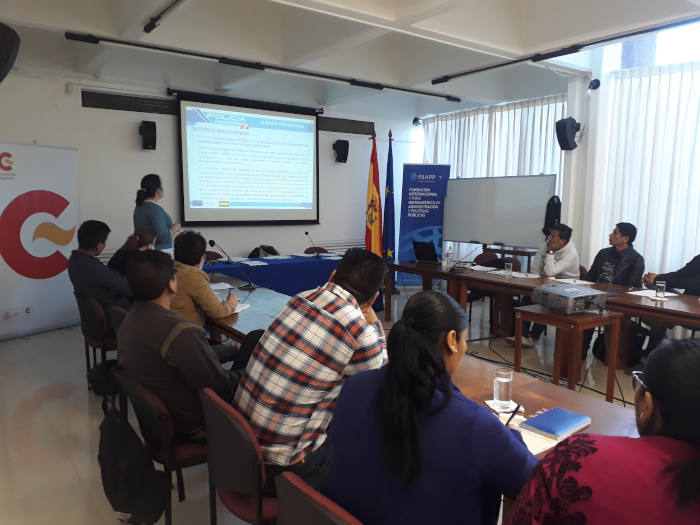-
17 January 2019
Category : Opinion
Money laundering, a relevant problem in Bolivia
Javier Navarro, a Spanish National Police inspector and expert in the European project to support Bolivian institutions in the fight against drug trafficking and related crimes, explains how this project deals with the problem of money laundering
 One of the money laundering project's activities
One of the money laundering project's activitiesMoney laundering is generally one of the most significant problems for states at the social, economic and political levels. Drug trafficking, the funding of terrorism and corruption are its most prominent predicate offences.
Through international treaties and trade agreements, efforts are being made to homogenise countries’ internal legislation to create a new framework that positively favours economic and social aspects; however, at the same time, criminal organisations are emerging that use loopholes to increase money laundering.
In this sense, the Plurinational State of Bolivia, through the Financial Investigations Unit, is developing and favouring numerous cooperation and collaboration actions among the country’s various financial institutions, strengthening the mechanisms aimed at preventing money laundering, such as preparing financial intelligence reports, reporting suspicious transactions and referring them to the judicial authorities if they find indications that a crime has been committed.
The institutional effort that they are putting in must be translated, in the next few years, into improving results in relation to obtaining a greater number of convictions and increasing the financial assets and resources confiscated due to money laundering, which can then be reused to continue strengthening structures to prevent this type of crime.
The European project to support Bolivian institutions in the fight against drug trafficking and related crimes, which is funded by the European Union and managed by FIIAPP, places special emphasis on the issue of money laundering. In the two years we have been working on the project, the focus has been on strengthening three main aspects.
On the one hand, we have sought to train the Bolivian Police, the Financial Investigation Unit, the Public Ministry and the Ministry of Justice through training courses in money laundering, seizure of assets, analysis of financial intelligence and financial cybercrime; we have also proposed future specialisation modules in money laundering for the Bolivian School of Judges and Prosecutors.
In addition, we have focused on strengthening inter-institutional coordination and international cooperation by establishing collaboration, support and advice channels and creating spaces of understanding between institutions that develop functions aimed at the prevention and investigation of money laundering.
Finally, we have given support and assistance to help pass the fourth round of the Financial Action Task Force of Latin America (Gafilat) Mutual Evaluation, which will take place in Bolivia in the second half of 2020.
We must also remember that the FATF Recommendations include the objectives of setting standards and promoting the effective implementation of legal, regulatory and operational measures to combat money laundering, the financing of terrorism and other threats related to the integrity of the international financial system.
Whether or not this Mutual Evaluation is passed will depend to a large extent on whether the Bolivian State can continue to stay off the famous black or grey lists composed of states that do not comply and do not commit themselves to establishing measures to prevent money laundering.
In 2019, the project will remain active and committed to all actions that strengthen public policies carried out in Bolivia to combat money laundering.
The views and opinions expressed in this blog are the sole responsibility of the person who write them.




